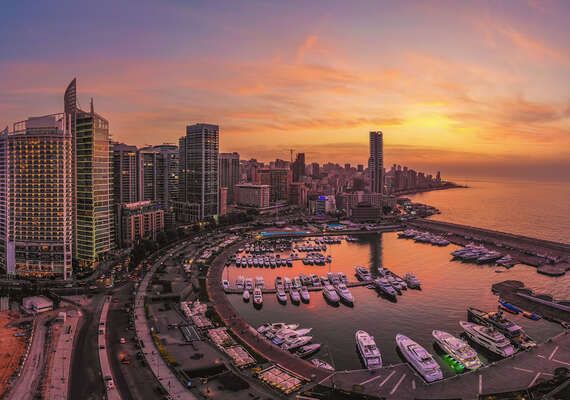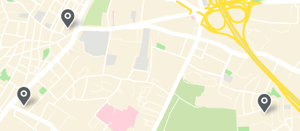Beirut City Guide

| Country: | Lebanon |
| Known Names: | |
| Language: | Arabic, French, English |
| Population: | 2,421,000 (2023) |
| Religion: | Islam |
| Area Code: | +961 |
| Currency: | Lebanese Pound (LBP) |
| Time Zone: | Eastern European Time - UTC/GMT+2 |
| Visa: | |
| Consulate: |
General Information / Guide
Beirut is a city where you can find plenty to do in both summer and winter, with its coastlines, cultural diversity, historical richness, and opportunities for mountain and winter tourism. Known as the "Paris of the Middle East" before the 1970s, Beirut is the capital and largest city of Lebanon. Situated between the foothills of the Lebanese mountains and the Mediterranean coastline, this port city offers visitors astonishing views and experiences thanks to its location.
Climate / Weather / When to Go
In the city, the weather varies from very hot to moderately cold throughout the year. With temperatures rising to 32-35 degrees Celsius during the summer months, it's perfect for a seaside vacation and outdoor activities in the mountainous areas. If you're visiting for the first time and plan to explore the city's historical treasures, the spring and autumn months seem more suitable. Along the coastline, temperatures range from 15 to 28 degrees Celsius, while in the mountainous regions, they fluctuate between 5 and 20 degrees Celsius.
How to Get There
You can reach Beirut through Rafic Hariri International Airport from many parts of the world. While there are no direct buses from the airport to the city, you can opt for shared taxis or minibusses services to get to your destination. The airport is conveniently located just 9 kilometers outside the city, making your journey to the heart of Beirut quite accessible.
Food / Restaurants / What to Eat and Drink
In Beirut, a delightful array of dishes awaits your taste buds. You can savor various mezes like eggplant salad, along with kebabs, wraps, and lavash, and pair them with ayran or an alcoholic drink. Grilled fish and chicken options, dishes made from succulent lamb, dolma, and delicious içli köfte (spiced meatballs) are also on the menu. Don't forget to try traditional sweets like baklava, Lebanese kunefe, or "gerebic." Apart from these, you'll find restaurants offering international cuisine and fast-food chains, ensuring that there's something to satisfy every palate. Beirut is a food lover's paradise, where the fusion of flavors and culinary traditions promises a memorable dining experience during your visit.
Important Places / Places to Visit
- National Museum of Beirut: Open between 9:00 AM and 4:00 PM, except on Mondays and holidays, this museum houses gilded Phoenician figurines, a collection of Byzantine gold jewelry, and various archaeological relics.
- Mohammad Al-Amin Mosque: This stunning mosque, with its golden spires and blue domes, covers an impressive 10,700 square meters and features minarets that stand at 72 meters in height.
- Bourj Hammoud: The Burj Hammud district, home to the Armenian Catholic community, offers a unique atmosphere and is worth exploring within the city.
- Nicolas Sursock Museum: Once belonging to one of the city's aristocrats, this villa now hosts Lebanese and international modern art pieces. The museum is nestled in the historic and affluent Ashrafieh district of Beirut.
- Raouche (Pigeon Rocks): These two rock formations at the western end of Beirut's coastline are one of the city's most popular natural wonders.
- Roman Baths: Discovered in 1968 behind Bank Street, these bathhouse remains have been on display for almost two decades.
- Achrafieh: This stylish area boasts a plethora of restaurants, cafes, and nightclubs, set amidst beautifully restored traditional homes and luxury apartments. A must-visit neighborhood in Beirut.
- Hamra/Corniche: Hamra, the major residential area for Muslims in Beirut, is brimming with hotels, shops, cafes, and restaurants. Explore the Corniche along the coast for scenic walks and a chance to take a dip in the sea.
- Dog River (Nahr el-Kalb): Located in the north of Beirut, this river offers the opportunity for boat trips and cave exploration.
- Churches: Visit the 18th and 19th-century churches like Saint George, Saint Elias, Saint Louis, Evangelical, and Saint George Cathedral that adorn the city.
- Ottoman Clock Tower: Built in 1897, this clock tower was lovingly restored in 1994.
- Byblos (Jbeil): This ancient port city, located 40 km north of Beirut, is a UNESCO World Heritage site with a rich history.
- Harissa: Take a cable car ride to this village, home to a grand statue of the Virgin Mary, which provides breathtaking views of the surrounding area.
What to Do
In Beirut, you can explore historical sites like mosques, museums, and ancient ruins, or relax on the city's beaches, taking a dip in the sea and basking in the sun. You can also enjoy strolls and shopping along the seaside promenade known as the Corniche. In addition to these activities, Beirut offers a vibrant nightlife with numerous clubs and bars. But the list of things to do doesn't end there. Lebanon's mountains are home to approximately six ski resorts, all within about an hour's drive from the capital city of Beirut. You can enjoy a winter vacation in these resorts between December and March.
Nightlife / Bars / Entertainment
Beirut is famous for its vibrant nightlife and entertainment, often referred to as the party capital of the Middle East. The epicenter of the city's nighttime festivities can be found on Gemmayze Street, where you'll discover a plethora of nightclubs and bars, making it the ultimate hub for after-dark entertainment.
Shopping / What to Buy
If you're looking for local handicrafts, you'll find them easily in the Corniche area. If shopping at renowned brands' stores is more to your liking, then Downtown is the place to be. Additionally, antique enthusiasts can explore the Souk el Ahad flea market, which takes place on Sundays. For a more traditional shopping experience, you can venture to the coastal cities of Tripoli and Sidon for century-old soap factories and authentic products. Beirut and its neighboring cities offer a diverse shopping experience that caters to all tastes and preferences.
Festivals/ Events
July-August: Baalbeck International Festival
June-September: Beirut Nights
July-August: Beiteddine Festival
July: Byblos International Festival
Holidays / Festivals / Important Days
January 1 - New Year's Day
January 6 - Christmas and Epiphany
February 9 - Feast of Saint Maron
March - Annunciation (Feast of the Announcement to the Virgin Mary)
End of March - Good Friday (Maronite, Catholic, Orthodox)
End of March to Early April - Easter
May 1 - Labor Day
First Sunday in May - Martyrs' Day
Second Sunday in May - Resistance and Liberation Day
Eid al-Fitr (Ramadan) and Eid al-Adha (varies each year and may differ according to Sunni and Shia sects)
August - Feast of the Assumption of Mary
November 22 - Independence Day
December 25 – Christmas
Things to Pay Attention to / Important Information
Beirut, a city where you'll often spot luxury cars on the road, experiences heavy traffic, making it important to stay vigilant whether you're driving or walking. When it comes to taxis, they often charge tourists higher fares than locals, so don't hesitate to haggle to get a fair price. When visiting mosques, it's not enough for women to cover their heads. You'll typically be provided with a black robe and headscarf by the mosque's attendants, and it's essential to wear these, while inside the mosque. This shows respect for local customs and religious practices.
Transportation
In Beirut, the city's public transportation primarily relies on buses and shared taxis, as there is no metro or tram system available. Visitors to the city often opt for using taxis as their mode of transport. Keep in mind that taxis in Beirut don't typically have meters, so fare negotiation is common practice.
